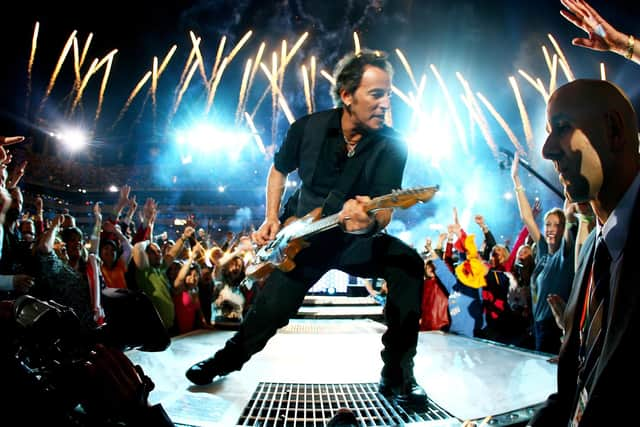Ticketmaster: Surge price ticket model is making live music too expensive for working class fans – Martyn McLaughlin
A flurry of bookings over the summer has continued into the autumn, and at the weekend, I managed to watch James Taylor in Glasgow, followed by Little Wolves, a raucous blues rock band, in a packed Dundee bar.
The music, of course, was only part of the appeal. Both occasions were a chance to enjoy some quality time with family and friends. If it was easy to take such things for granted before the pandemic, that is certainly no longer the case.
Advertisement
Hide AdAdvertisement
Hide AdWhat a shame it is, then, that so many people with plans similar to my own are being priced out of gigs in the name of blatant profiteering.


There is a growing and long overdue backlash forming against Ticketmaster, one of the world’s biggest ticket sales and distribution firms, over the way it charges for some of the most popular artists.
The exorbitant prices set by its dynamic pricing system have forced music fans to pay through the nose for some of the most sought after touring acts passing through Scotland.
Coldplay’s series of concerts at Hampden in August are a case in point. Although the first tier of tickets for the open-air shows were priced at £75, many fans logging online to book their place quickly found that they would have to pay £221 for the same tickets.
The system, similar to Uber’s surge-pricing model, sees the prices rise in tandem with demand. Problematically, however, the prices also go up in line with speculative tickets being sold by tours for huge mark-ups. That is in no way reflective of actual demand, but it is forcing the prices to go sky high.
For its part, Ticketmaster argues that the process allows fans an opportunity to “safely buy official tickets for the events they love, right up to the date of the show”.
It may sound good in theory, yet the subtext is barely disguised: we’ll protect you from the risk of buying through unofficial touts, but we’ll still charge you prices similar to what they would have.
In theory, it is possible to obtain cheaper tickets in the hours and days before a show, if there is sufficient capacity remaining, but what kind of way is that to cater to ordinary working folk who simply want to see their favourite act in the flesh?
Advertisement
Hide AdAdvertisement
Hide AdThe same price hikes occurred after tickets went on sale recently for Bruce Springsteen’s eagerly anticipated show in Edinburgh next summer. Having originally gone on sale for a reasonable £73, basic briefs at the back of Murrayfield quickly commanded an asking price of more than £500, a near-sevenfold increase.
In the wake of fan protests in the US, where Ticketmaster’s dynamic pricing system saw some tickets for The Boss advertised for £3,300, Springsteen’s manager, John Landau, defended the strategy, insisting that the “true average ticket price” remained around £220.
It was, and remains, a tone deaf response to the concerns of genuine fans. How can it be possible that in order to attend a gig, the total outlay for someone booking travel and a hotel room is not dissimilar to the price of a modest family holiday?
Even before the spike in inflation and the deepening cost-of-living crisis, such prices were unconscionable. Now, they simply beggar belief.
It is not just live music that is falling victim to this blatant rip-off. Dynamic pricing is increasingly commonplace at major sporting events, too. Only last month, organisers of the British Grand Prix at Silverstone apologised to motorsports fans and promised a “root and branch review” of its ticketing plans after a shambolic general sale.
Unprecedented demand on its website caused price increases that were expected to be implemented over a period of weeks to be applied in a matter of hours. It meant that in the time it took some fans to select their tickets and pay for them, the price they saw on-screen had increased by as much as £70.
Indeed, this rapidly changing variable price system even transcends the events business. Their use by travel firms and airlines is already widespread, and thanks to the ever increasing use of artificial intelligence, pricing and promotions are being adjusted by retailers almost in real time.
The online shopping giant, Amazon, has led the way on this, using machine learning, personal data, and demand surges to reprice millions of items as frequently as every few minutes. Sometimes, this is to the advantage of consumers, such as when a price is slashed when a competitor announces a discount or promotion.
Advertisement
Hide AdAdvertisement
Hide AdOften, however, it looks like little more than price gouging to take advantage of not just demand, but panic and desperation. During the pandemic, the Unite union accused Amazon of “exploitative abuse of its dominance” by holding a near-monopoly on some home-delivered products which saw their prices jump dramatically.
It is perhaps inevitable that live music has become the next fluctuating commodity, and in truth, it is not surprising to see prices rise in the wake of the pandemic. Putting on a big stadium show is a notoriously expensive business, and Brexit-related issues with supply chains and shortages of skilled crew have driven costs up.
Even so, the increases are neither proportionate nor defensible, and the rationale behind them is inexcusable. It has reached the stage where working class audiences are being denied the chance to see the acts they love.
It may take the sight of row after row of empty seats to change the minds of artists and promoters who persist with this pricing model. It is a fundamentally broken business model, and the sooner it is fixed, the better.
Comments
Want to join the conversation? Please or to comment on this article.
